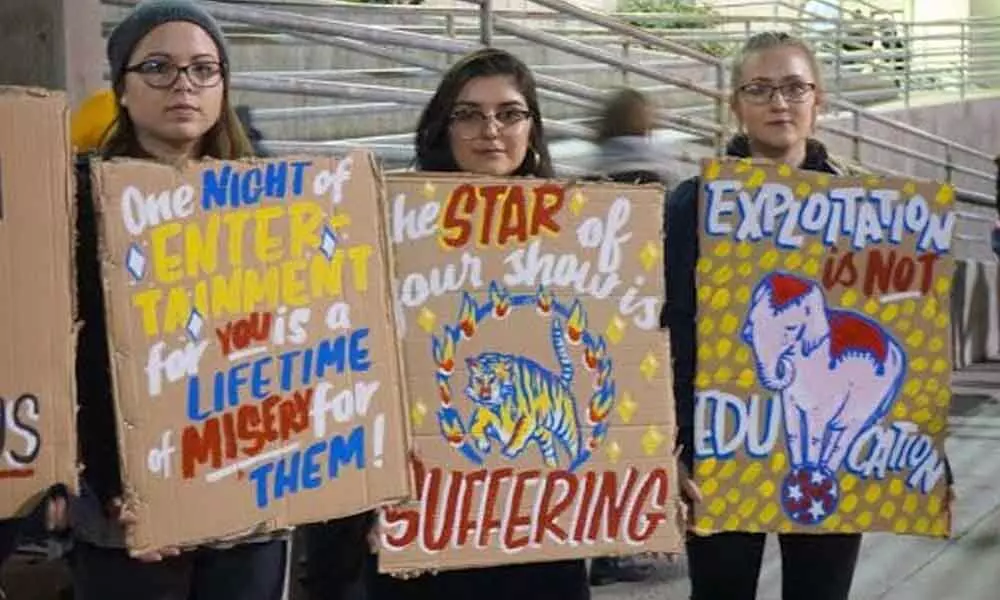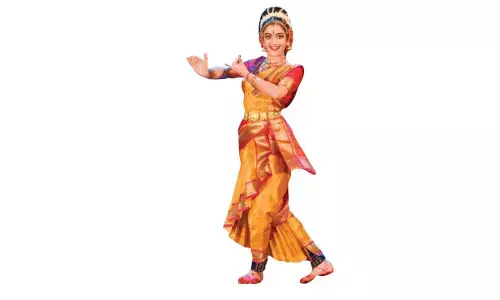Animals deserve to be treated better

Animals deserve to be treated better
“The greatness of a nation and its moral progress can be judged by the way its animals are treated.” – Mahatma Gandhi
"The greatness of a nation and its moral progress can be judged by the way its animals are treated." – Mahatma Gandhi
'Virtus sola nobilitat' is the motto of my school, the All Saints' High School, Hyderabad. Virtue alone, to translate, ennobles. After years of search for the true definition of sin and virtue I have, in this evening of my life, come to the conclusion that whatever act brings a smile to another person's face is virtuous, and causing suffering or pain to man or animal, a sin.
Even in conducting a crusade, such as the Indian Independence movement, Mahatma Gandhi firmly adhered to the path of non-violence or 'ahimsa'. He also was a passionate advocate of vegetarianism.
I am halfway through watching a Telugu movie, about a person who succeeds his ambition to become cine villain. After achieving considerable success, he suddenly loses his natural psychopathic tendencies, on account of the grievous injury caused to a person in an accident caused by his driving in a drunken state.
The plot, like so many others in the so called 'Bollywood' and 'Tollywood' movies today, is spun around a good theme, but interspersed liberally with scenes involving sex and violence. Apparently, that is the stuff which the audiences like not only in the Telugu speaking States, but elsewhere in the country and also abroad too.
History is replete with accounts of gruesome and cruel pastimes involving the abuse of animals as a means of entertainment. While most of these activities have long been made illegal, they are by no means gone for good.
No animal should be forced to perform tricks in order to earn money for their human captors.
As far as circuses are concerned, animal rights activists say that animals have a right to be free of human use and exploitation. In 2009, Bolivia became the first country in the world to ban all animals in circuses. China and Greece passed similar bans in 2011 and 2012, respectively.
Highlight:
History is replete with accounts of gruesome and cruel pastimes involving the abuse of animals as a means of entertainment. While most of these activities have long been made illegal, they are by no means gone for good. No animal should be forced to perform tricks in order to earn money for their human captors. As far as circuses are concerned, animal rights activists say that animals have a right to be free of human use and exploitation
The United Kingdom has banned the use of "wild" animals in circuses but allows "domesticated" animals to be used. Animals in circuses are often beaten, shocked, kicked, or cruelly confined in order to train them to be obedient and do tricks. Lions and tigers for instance, are beaten, starved, and confined for long periods of time in order to get them to cooperate with what the trainers want. African elephants in the wild live more than three times as long as those kept in zoos.
The European Association of Zoos and Aquaria (EAZA) said in 2007 that member zoos were being actively encouraged to kill unwanted animals, including tigers, if other zoos did not want them and if they were hybrids. It said that such animals take up space and keeper time. One solution, it seems, is to go vegan, boycott circuses with animals, and support animal-free circuses, such as Cirque du Soleil and Cirque Dreams!
My father was a keen punter. I went once for the Governor's Cup and made 28 rupees! Still the sport has its gory side as well. Horse racing has a reputation for elegance and attracts many wealthy owners and audience members. Horses are abused by trainers and others in order to make them run as fast as possible, no matter the consequences to their health and happiness. If you thought the deaths during races were staggering, you will be horrified to know that over 10,000 thoroughbreds from the US are sent to slaughter, every year usually to Mexico, when they are no longer "of use."
Bullfighting is a traditional European and Latin American sport that involves bulls being publicly baited, taunted, lanced and eventually stabbed to death by bullfighters inside a ring. Fights often result in severe injuries for the fighter, and always end in death for the animal. Despite its blatant cruelty and violence, the sport is considered by many to be a cultural tradition, and even an art form, and has thus evaded scrutiny in Spain.
Ram fighting is a blood sport between two rams held in a ring or open field common in in Africa, Asia Europe, Nigeria, Uzbekistan and Indonesia, categorized as a blood sport and an act of animal cruelty.
The dog racing industry is notorious for committing some of the most heinous and egregious forms of animal cruelty including neglect, starvation, mutilation, drugging, abuse and abandonment.
Cockfighting, for instance, is a blood sport that has been around for hundreds of years and is one of the most atrocious events imaginable for the poor birds involved, yet in many countries around the world, it is still considered to be a mainstream activity and an integral part of the culture.
The position of animal welfare activists is that humans have a right to use animals, but cannot harm animals gratuitously and must treat them "humanely." What is considered "humane" varies greatly. Many animal welfare advocates consider fur, foie gras, and cosmetics testing to be frivolous uses of animals, with too much animal suffering and not much benefit to humans. Some animal welfare advocates would say that eating meat is morally acceptable as long as the animals were raised and slaughtered "humanely."
In order to assist in the prevention of cruelty to animals, rehabilitation of maltreated and unwonted animals Society for the prevention of cruelty to animals was first founded in England in 1824.There is now a worldwide network of such organisations.
The Blue Cross of India was started in 1964 essentially to ensure that all animals, whether domesticated or wild, are protected from cruelty by human beings. Maneka Gandhi and Amala Akkineni are well-known crusaders of this movement.
Unfortunately, enjoying watching the inflicting of pain or cruelty is not confined to animals alone as the objects of entertainment. Even in ancient times the Roman 'gladiators' fought each other to entertain crowds. They lived violent and dangerous lives and were subject to the whims of their superiors while having no rights in society and hardly considered as people at all.
What is more, there were female gladiators too. And, in current times, sports such as wrestling and boxing are still patronised all over the world. I remember having watched a series of wrestling bouts in Hyderabad city in the early 60s when legendary figures such as King Kong, Dara Singh and Flash Gordon were very popular.
It is, no doubt, also true that in sports and games essentially meant for entertainment and wholesome enjoyment such as, for instance, football cricket or hockey, the possibility of being hurt, or even grievously injured, cannot be ruled out. But the important point is that such incidents are accidental and not built into the design of the game or sport.
In the stress-filled environment we all live in, in this age of intense competition and largely materialistic pursuits, it is essential that avenues for relaxation and entertainment are provided for. The point being made is that the architecture of such activities can always be such as to preclude the need, either for accidental, or intentional, harm, either to the participants or, for that matter, to the spectators!
(The writer is former Chief Secretary, Government of Andhra Pradesh)











